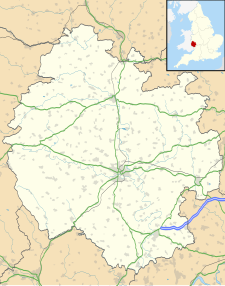
Hereford is a cathedral city and the county town of Herefordshire, England. It lies on the River Wye, approximately 16 miles (26 km) east of the border with Wales, 23 miles (37 km) north-west of Gloucester and 24 miles (39 km) south-west of Worcester. With a population of 53,112 in 2021, it is the largest settlement in Herefordshire.
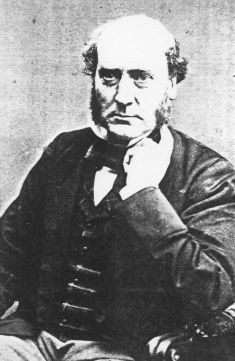
Sir George Gilbert Scott, largely known as Sir Gilbert Scott, was a prolific English Gothic Revival architect, chiefly associated with the design, building and renovation of churches and cathedrals, although he started his career as a leading designer of workhouses. Over 800 buildings were designed or altered by him.

Ledbury is a market town and civil parish in the county of Herefordshire, England, lying east of Hereford, and west of the Malvern Hills.

Ross-on-Wye is a market town and civil parish in Herefordshire, England, near the border with Wales. It had a population estimated at 10,978 in 2021. It lies in south-east of the county, on the River Wye and on the northern edge of the Forest of Dean.

Herefordshire is a ceremonial county in the West Midlands of England. It is bordered by Gloucestershire to the south-east, Worcestershire to the east, Shropshire to the north and the Welsh counties of Monmouthshire and Powys to the west. The city of Hereford is the largest settlement and the county town.
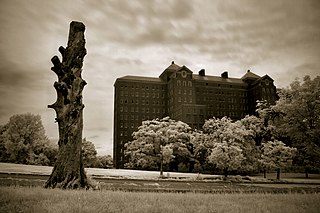
The Kings Park Psychiatric Center, known by Kings Park locals as "Kings Park Asylum", is a former state-run psychiatric hospital located in Kings Park, New York. It operated from 1885 until 1996, when the State of New York closed the facility, releasing its few remaining patients or transferring them to the still-operational Pilgrim Psychiatric Center.

Friern Hospital was a psychiatric hospital in the parish of Friern Barnet close to a crossroads which had a hamlet known as Colney Hatch. In 1965, it became part of the London Borough of Barnet and in the early 21st century was converted to residential housing as Princess Park Manor and Friern Village. The hospital was built as the Second Middlesex County Asylum and was in operation from 1851 to 1993. After the County of London was created in 1889 it continued to serve much of Middlesex and of the newer county, London. During much of this time its smaller prototype Hanwell Asylum also operated.
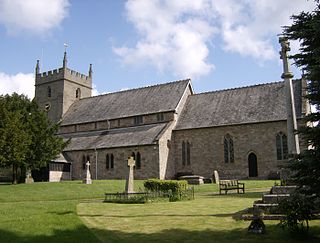
Burghill is a village and civil parish in Herefordshire, England, north-west of Hereford. The parish includes the villages of Burghill, Tillington, Portway and Eltons Marsh. It was originally a small village of farms and orchards situated on the road from Moreton-on-Lugg.
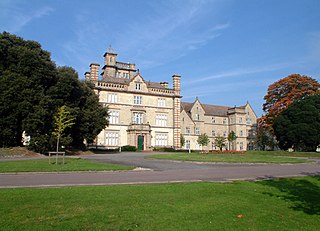
Fulbourn Hospital is a mental health facility located between the Cambridgeshire village of Fulbourn and the Cambridge city boundary at Cherry Hinton, about 5 miles (8 km) south-east of the city centre. It is managed by the Cambridgeshire and Peterborough NHS Foundation Trust. The Ida Darwin Hospital site is situated behind Fulbourn Hospital. It is run and managed by the same trust, with both hospitals sharing the same facilities and staff pool.

Oregon State Hospital is a public psychiatric hospital in the U.S. state of Oregon, located in the state's capital city of Salem with a smaller satellite campus in Junction City opened in 2014. Founded in 1862 and constructed in the Kirkbride Plan design in 1883, it is the oldest operating psychiatric hospital in the state of Oregon, and one of the oldest continuously operated hospitals on the West Coast.

Stannington is a village and civil parish in Northumberland, England. The population of the civil parish was 1,219 at the 2001 Census, increasing to 1,280 at the 2011 Census. Stannington is divided into three: Stannington North-East Quarter, Stannington North-West Quarter and Stannington South Quarter. The total area of Stannington, including Stannington Vale, is 10,093 acres (40.84 km2).
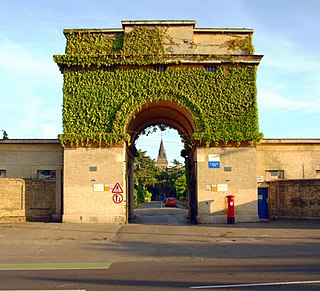
St Bernard's Hospital, also known as Hanwell Insane Asylum and the Hanwell Pauper and Lunatic Asylum, was an asylum built for the pauper insane, opening as the First Middlesex County Asylum in 1831. Some of the original buildings are now part of the headquarters for the West London Mental Health NHS Trust (WLMHT).

The Trans-Allegheny Lunatic Asylum, subsequently the Weston State Hospital, was a Kirkbride psychiatric hospital that was operated from 1864 until 1994 by the government of the U.S. state of West Virginia, in the city of Weston. Weston State Hospital got its name in 1913 which was used while patients occupied it, but was changed back to its originally commissioned, unused name, the Trans-Allegheny Lunatic Asylum, after being reopened as a tourist attraction.

St Conal's Hospital was a psychiatric hospital located in Letterkenny, County Donegal, Ireland. Opened in 1866, it had people work on its farm as recently as 1995. The building is still extant.

St Augustine's Hospital was a psychiatric hospital in Chartham, Kent, England. It was founded as the second, or East, Kent County Asylum in 1872. In 1948 the hospital became part of the National Health Service and was renamed St Augustine's Hospital. The hospital gained notoriety in the 1970s when it was the subject of a committee of inquiry into malpractice and mismanagement. St Augustine's Hospital closed in 1993 and the site is now occupied by housing, although a few of the original hospital buildings remain.

Lancaster Moor Hospital, formerly the Lancaster County Lunatic Asylum and Lancaster County Mental Hospital, was a mental hospital in Lancaster, Lancashire, England, which closed in 2000.
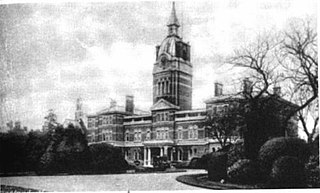
Banstead Hospital, also known as Banstead Asylum, was a psychiatric hospital in the village of Belmont, Sutton, adjacent to Banstead.

Hereford General Hospital was a health facility located on Nelson Street in Hereford. The main building, which has since been converted into apartments, remains a Grade II listed building.
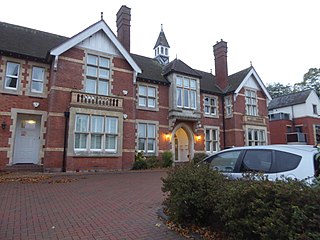
The Victoria Eye Hospital was a health facility located on Eign Street in Hereford, England. The main building has since been converted into apartments.

The Church of St Mary Magdalene is an Anglican church in the village of Stretton Sugwas, in Herefordshire, England. The church is in the Burghill Benefice. The building, dating from the late 19th century, incorporates features from the earlier 12th-century church. It is Grade II* listed.

